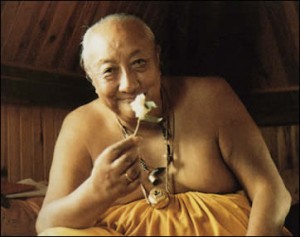The following is an excerpt from “The Heart of Compassion: Thirty Seven Verses on the Practice of a Bodhisattva”:
On a practical level, however, the mere fact that you feel compassion
for them is of no use whatsoever to all those beings. So, what can you
do to actually help them? You now have a human existence with all its
freedoms and advantages, and especially the immense fortune of having
encountered and started to practice the supreme Dharma. You have met
an authentic spiritual teacher and are in the process of receiving
teachings that will enable you to reach buddhahood in a single
lifetime. To make full use of this precious opportunity, you must not
only listen to the teachings but also put them into practice. That way
your feelings of compassion can be put to work, to the point that you
will eventually be able to bring all living beings to enlightenment.
As things are at present, however strongly you may want to help
others, you are a beginner and lack the capacity to do anything much
for them. The first step you need to take toward being really useful
to others, therefore, is to perfect yourself, by training and
transforming your mind.
The way you are now, your mind is powerfully influenced by the
clinging attachment you have to friends, relatives, and anyone who
brings you satisfaction, and by your hostile feelings toward whoever
seems to go against your wishes and toward all those who prevent you
from acquiring wealth, comfort, and pleasure and whom you therefore
regard with aversion as enemies. ln your delusion, you do whatever you
can to benefit yourself and those you like, and try to overcome and
eliminate all those you consider enemies with such aversion that you
can hardly bear even to hear their names. Over countless lifetimes you
have been dragged into samsara, this vicious ocean of existence, and
carried away by these strong currents of attachment and aversion.
Attachment and aversion are the very cause of samsara, the very reason
for our endless wandering in the circle of existence.
Consider carefully what you mean by friends and enemies. When you look
into it, it is obvious that there are no such things as permanent.
enduring friends or enemies. Those you think of as friends have not
always been so. Indeed, they may well have been your enemies in the
past, or they could become your enemies in the future. There is
nothing certain about it. Why should you be so compulsively attached
to particular people? Are not all your relationships temporary? In the
end, whatever may happen during your life, the time will come for you
to die. Then you will have no choice but to part from everyone,
regardless of whether you feel attachment or aversion for them. But
everything you have done in your lifetime, all those actions motivated
by attachment and aversion, will have created within you a force that
will then propel you to the next life, in which you will experience
their result.
So, if you want to travel the path to buddhahood, give up attachment
to friends and relatives, and hatred for enemies. Regard all beings
with impartial equanimity. If people now seem to be either friends or
enemies, it is just the result of past connections and actions. To
ascribe any solid reality to those feelings of attachment and
aversion, arising as they do from mistaken and confused perceptions,
is just delusion. It is like mistaking a rope, lying in your path in
the twilight, for a snake-you might feel afraid, but that does not
mean your fear has any real basis. The rope never was a snake.
